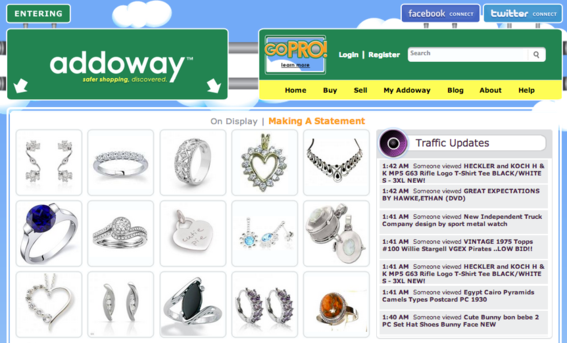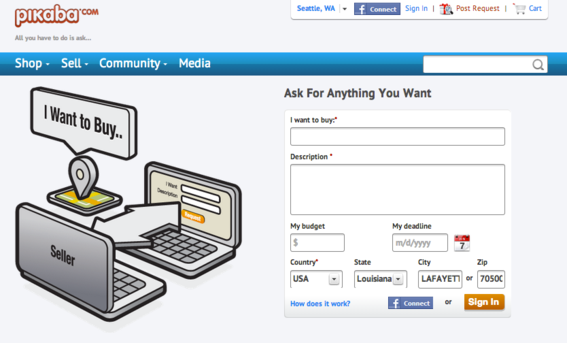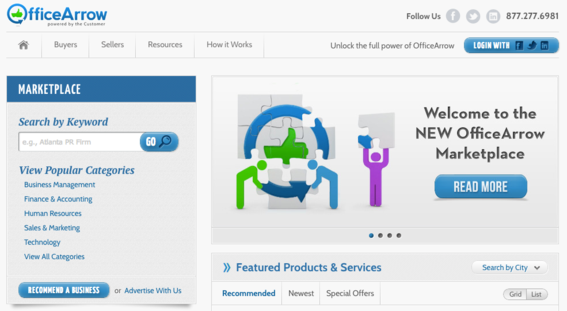Social marketplaces promote interaction between merchants and their customers, and enable product discovery in a social environment where shoppers can rely on the influence of friends to help them make informed shopping decisions.
One successful social commerce model is bazaar-style marketplaces, where buyers and sellers exchange goods and services in a way that fosters transparency and trust.
Here are five sites that leverage both the commerce and community aspects of selling. I then suggest four options for merchants to integrate social selling into their own websites.
1. Addoway

Addoway integrates with Facebook’s Social Graph.
Addoway is an Etsy-style marketplace for smaller, independent retailers. The site integrates with Facebook’s Social Graph, enabling users to recommend merchants that friends have purchased from or have experienced in some manner. It also allows customers to see their friends’ purchase history and view which sellers they have bought from.
To support greater trust, sellers are encouraged to link to Klout, a site that measures a person’s social influence, and display their scores. Sellers can also link their Facebook, Twitter, and other social network accounts.
By aggregating a seller’s reputation, credibility, and influence scores, the site offers an inside look into the seller before making a purchase.
2. Pikaba

Merchants compete to offer the best deals on Pikaba.
Pikaba is a social shopping network that covers many categories, from antiques to video games. The site works like a reverse auction. Instead of buyers bidding on products, consumers propose requests for products and merchants compete to offer their best price.
Once a request has been captured in the system, it gets analyzed and processed, and is then forwarded to merchants and service providers. Pikaba’s users can provide advice on where to find an item or make recommendations about particular merchants.
Consumers can also join groups to obtain even better deals for products. For example, one group interested in purchasing an Xbox 360 has more than 3,500 members.
Merchants must register and pay a monthly fee ranging from $20 to $100 to participate on the site. In exchange for registration they receive an online store, lead generation, direct access to groups, and product reviews. They can also upload products from eBay or use data feeds.
3. Buyosphere

Buyosphere attracts designers and consumers interested in fashion.
Buyosphere is a niche marketplace, focused on fashion. Users can browse style guides created by community members, suggest products or ask for advice on where to find specific products.
The site attracts both individual sellers and retailers that carry unique designs that are unlikely to be found in department stores.
4. OfficeArrow

OfficeArrow is a B-to-B marketplace.
OfficeArrow is a business-to-business social marketplace that contains business listings organized by category and location. The strength of the site is unbiased ratings and reviews by community members. A business listing receives ratings from customers who have used its products and services.
Retailers that wish to participate in the site must first purchase an advertising package.
5. 99designs

99designs matches those in need of web design with freelance designers.
99designs is a marketplace that puts those in need of logo and web design together with freelance designers, who bid on projects and create concepts based on project requirements submitted by the buyer. Presented with a number of designs, the buyer then selects the winning bid.
99designs gives the buyer affordable options from which to choose and supplies the designer with many projects upon which to bid.
Suggestions for Merchants
Here are four suggestions for merchants wanting to leverage the benefits of social marketplaces.
- List products on existing relevant marketplaces, whether in niche communities like OfficeArrow or more broad-based ones, such as Pikaba.
- Build social functionality into your own ecommerce website to foster community. This could include peer-to-peer ratings and reviews systems, Facebook social plugins, blogs, forums, or groups. Tap into Facebook’s Open Graph to further extend social connectivity and encourage social sharing.
- Create an Amazon-style marketplace where not only do you sell your own products, but allow others to sell, as well.
- Establish niche communities based around topics of interest to consumers, following the example of Buyosphere.




